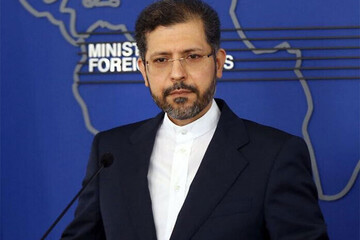Speaking in his weekly press conference, Khatibzadeh said that the IAEA chief’s Saturday trip to Iran was technical and in continuation of the talks in Vienna.
We will cooperate with the UN nuclear watchdog based on the joint statement issues on Saturday, the spokesman said, adding that the Islamic Republic of Iran had responded to the IAEA’s questions, but the answers had to be given again within technical framework and in a specific period.
Khatibzadeh confirmed that there was a direct link between closing the IAEA’s open issues and the potential deal in Vienna.
Asked about the Russian foreign minister’s remarks on the effect of anti-Russian sanctions on Moscow-Tehran trade, Khatibzadeh said that Iran is waiting to hear what was said from diplomatic channels.
The talks are followed up in the proper path, he added, and it was clear that Iran’s peaceful nuclear cooperation should not be limited nor should it be affected.
The diplomat described Russia’s approach in Vienna “so far constructive”, adding that the teams have gathered together in Vienna to reach a collective agreement.
Khatibzadeh also described China’s stance in Vienna Talks as one of the most constructive ones, which would be pursued in the same path by Iran.
On the possibility of direct talks between Tehran and Washington, Khatibzadeh underlined that the US was no more a participant of the JCPOA and the commitments that it had to take on were clear for Iran and the P4+1, as it was willing to return to the deal.
A request for direct negotiation would be meaningful only when Iran knows the reason for such a meeting, he continued.
We haven’t witnessed any change in US’ behavior to date, the spokesman noted, adding that they have kept up with the maximum pressure against the Iranian people.
Khatibzadeh said that the two recent rounds of talks could be differentiated from the previous six rounds by continuity and change.
There was neither a complete continuity nor was there a complete change, he further elaborated, adding that what was happening in Vienna today was in the maximum interests of the Iranian nation with all of the red lines and instructions being observed by the Foreign Ministry.
On the Ukraine crisis, the spokesman said that foreign policy of the Islamic Republic of Iran was to reject war as a solution to crisis, taking into consideration, though, the geopolitics of the region, international treaties and bilateral agreements between countries.
What is happening in Ukraine is the result of NATO’s measures, he said, but Iran has invited everyone to a ceasefire and asked to address concerns on a diplomatic ground.
We are collaborating with our friends in Russia to help establish an immediate ceasefire, Khatibzadeh said, adding that the agreements between Ukraine and the former USSR were known and it was natural for every nation to stay with its government in such conditions.
He said that Iran’s foreign minister had received sporadic reports on deploying fighters from other countries to Ukraine, but it should be verified.
The most important thing is that everyone should try to keep the crisis under control and not let the war spread out, he went on to say.
Eurasia has had and is having enough of crises and Iran is supporting the negotiations to result in an immediate ceasefire and diplomatic solution, he added.
On the reports claiming that Russia wanted to pull out of the JCPOA, Khatibzadeh said that the Foreign Ministry had no credible information on the issues, but he reaffirmed that China and Russia had so far acted responsibly.
Asked about the concerns raised by some members of Iran’s Parliament on the talks in Vienna, the spokesman said that Foreign Minister Hossein Amirabdollahian had a meeting with 70 MPs this morning on different issues.
Some progress have been made in the negotiations and Iran is waiting for the American side to do its part of commitments and if they don't walk back the night before the implementation day, an important humanitarian issue could be solved, he said on the prisoners exchange talks with the US.
About evacuating Iranian citizens from Ukraine, Khatibzadeh said that the Ministry of Foreign Affairs had been working on taking citizens out of Ukraine and bringing them back home, as two planes evacuated a number of citizens yesterday.
The spokesman said on the outstanding issues in Vienna Talks that there were only a few topics waiting for the US to respond.
If Washington adopts a logical approach and considers the concerns of Iran and the P4+1, a deal is available in the shortest time possible, he further said.
Iran wouldn’t accept any deadline, as it is seeking for a good deal that covers its national interests, Khatibzadeh underlined.
Khatibzadeh also said that Iran and Saudi Arabia have held four rounds of talks so far in Baghdad in good, respectful and positive atmosphere, but no timing has been set for the fifth round.
The spokesman said that the audience of the Israeli regime’s diplomatic efforts in Vienna were European capitals and the P4+1, but the apartheid regime of Israel has an approach of phobia, terror, sabotage and manipulation of any diplomatic solution to international issues.
Both friends in Russia and the elite in other countries are aware of the Israeli regime’s hostility towards peace in the international arena, Khatibzadeh noted.
9416**9417


Your Comment